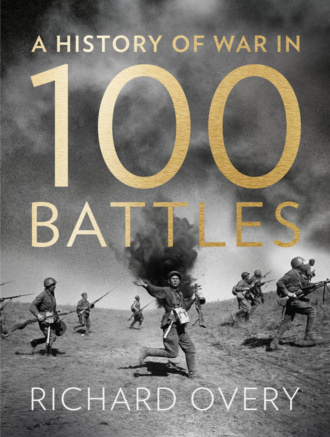
Полная версия
A History of War in 100 Battles
In some cases, battles have been used to serve as symbols or myths to endorse a particular political order or to encourage a shared cultural identity, and have soon assumed a historically abstract character, important for what they might mean for future generations and often surrounded by embellishments that turn the account from historical reality into a comfortable legend. For most ancient and early medieval battles, historians rely on accounts that are literary representations of what might have happened, largely devoid of detail and usually written long after the event. The eleventh-century epic French poem Chanson de Roland was based loosely on a battle that took place at Roncesvalles three centuries before, but its purpose by then was to enshrine notions of Christian nobility in French culture. The famous battle on the ice at Lake Peipus in 1242, where Alexander Nevsky drove back the German invader, was distorted by centuries of myth-making, and in the twentieth century it was adopted as a central motif of Soviet propaganda against the fascist enemy in the Second World War. The Battle of Britain and the Battle of the Somme have become central epic accounts in the search for a British identity, symbols of endurance and courage. Other battles are appropriated as foundation moments – the Battle of the Volturno River in 1860 cemented the unification of Italy; Marengo paved the way for Napoleon’s empire; Actium in 31 BCE became the founding battle of the Augustan age and the triumph of Octavian. There is also a history of how battles have been remembered once they are transformed over time into legend, distinct from the history of the battles themselves.
‘Battle’ as the key element of warfare for at least the past 4,000 years may nevertheless be dying out. The American belief that there is now a fundamental ‘Revolution in Military Affairs’ (RMA) – prompted by the new possibilities opened up by cyberwar and precise drone strikes – might make battle in a conventional sense obsolete. The exploitation of the ‘cognitive domain’ suggests that enemies could be subject to psychological pressures and threats that produce disorientation and uncertainty sufficient to obviate the need for actual killing. Perhaps the world is about to enter on one of those long periods of tranquility detected by archaeologists when they examine the hidden record of prehistoric violence. Or then again, perhaps not.
Конец ознакомительного фрагмента.
Текст предоставлен ООО «ЛитРес».
Прочитайте эту книгу целиком, купив полную легальную версию на ЛитРес.
Безопасно оплатить книгу можно банковской картой Visa, MasterCard, Maestro, со счета мобильного телефона, с платежного терминала, в салоне МТС или Связной, через PayPal, WebMoney, Яндекс.Деньги, QIWI Кошелек, бонусными картами или другим удобным Вам способом.




